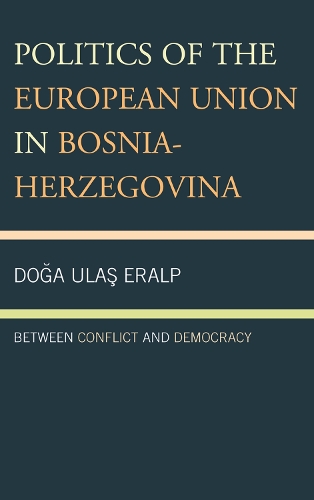
Politics of the European Union in Bosnia-Herzegovina: Between Conflict and Democracy
(Paperback)
Publishing Details
Politics of the European Union in Bosnia-Herzegovina: Between Conflict and Democracy
By (Author) Doga Ulas Eralp
Bloomsbury Publishing PLC
Lexington Books
10th June 2014
United States
Classifications
Tertiary Education
Non Fiction
Political structures / systems: democracy
341.24220949742
Physical Properties
Paperback
148
Width 154mm, Height 227mm, Spine 12mm
236g
Description
Politics of the European Union in Bosnia-Herzegovina: Between Conflict and Democracy, by Doga Ulas Eralp, evaluates the European Union's ability to transform the escalating political tensions at a period where the postconflict balance of the Dayton Peace Agreement is turning increasingly unsustainable. Eralp questions whether reforms integral to the EU membership process and existing European crisis management mechanisms can liberate Bosnian politics from the help of ethno-nationalism and plant the seeds for a successful liberal democracy. Eralp's text captures the tools and history of the EU's accession strategy for Bosnia-Herzegovina and the challenges of the Dayton system as two interrelated narratives, both exploring the realities of Bosnian politics and analyzing the overall quality of Bosnian democracy. Bosnia's consociational system, the role of the international community, and the intervention of the European Union are all put under the spotlight as the institutional and political factors behind Bosnia's stagnation. The text concludes with a discussion of factors that impact the effectiveness of the European Union as an important transformative actor in Bosnia.
Reviews
The guns have been silent for nearly two decades in Bosnia yet the country remains divided and dysfunctional. This book explains why, and how the European Union is not an effective force for conflict transformation. It is a necessary antidote for those who believe in the miraculous power of the EU in the Balkans. -- Gerard Toal, Virginia Polytechnic Institute and State University
Twenty years on from the outbreak of war in the former Yugoslavia, and with the EU intent on strengthening its common foreign and security policy, this is a timely look at the EU's capacity for managing and transforming conflict on its very own doorstep. Eralp's crisp analysis, crticial eye and clear conclusions highlight many of the deficiencies of the EU's approach to peace-building; making this book an indispensable contribution to the on-going debate about whether or not the EU can become an effective global actor. -- Ian Bancroft, Co-founder and executive director of TransConflict
Eralp (consultant, World Bank Group) has published articles and book chapters on the Western Balkans, Cyprus, the EU, and Turkey, and has been a consultant to international organizations and think tanks in various countries. This book evaluates the EU's effectiveness in executing its responsibility for peace building in Bosnia-Herzegovina against the backdrop of the bloody 1992-95 war there, which was officially ended with the signing of the Dayton Peace Agreement in late 1995. Since then, Bosnia-Herzegovina's political system and economy have remained stagnant. All the while, Bosnia-Herzegovina has strained to build a viable constitutional democracy in the face of persistent internecine conflict among its Muslim, Catholic Croatian, and Orthodox Serbian communities. Examined closely by the author are the historical and institutional constraints associated with the EU's peace-building role. Well written and readable, the book will appeal mostly to academics and professional scholars keyed to Balkan affairs, supranational organizations, conflictive nationalisms, and the challenge of conflict resolution. This case study could have been strengthened, had it drawn from the substantial social science literature on conflict theory and conflict resolution. Summing Up: Recommended. * CHOICE *
Author Bio
Doga Ulas Eralp taught conflict resolution at Sabanci University in Istanbul, and currently works as a consultant for the World Bank Group in Washington, D.C.
